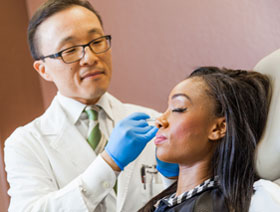 When you have a skin problem like acne, you tend to want it to go away. Right! Now! This is especially true for teens, who are the demographic most likely to suffer from acne.
When you have a skin problem like acne, you tend to want it to go away. Right! Now! This is especially true for teens, who are the demographic most likely to suffer from acne.
But many acne medications take time to work, and switching from one medication to another too rapidly doesn’t give any of them a chance to “kick in”. Changing up acne medicine regimens too quickly can also make acne worse by stressing your skin. And with some acne treatments, things get worse before they get better. In fact, many acne patients give up on their acne treatment right before they would have started to see results! This can be frustrating for patients, their parents, and their dermatologists.
How Long Does it Take for Acne Medicine to Work?
Acne is not a quick fix, and some medications work better for some people than others. However, you will not know if a medication works for you without giving it enough time to produce the desired results.
Let’s take a deeper dive into some common acne medications, how they work, and how long it typically takes to get results.
Benzoyl peroxide. Benzoyl peroxide can be found in many over-the-counter products aimed at treating acne. It works by reducing the amount of p. acnus bacteria on the skin. This bacteria is the most common bacteria found on human skin, but contributes to the development of acne.
Typically a topical product with benzoyl peroxide will be used once or twice a day to get results. It takes about 3 weeks of consistent use to notice an improvement in acne using benzoyl peroxide. Maximum results occur after 8 to 12 weeks of use.
Salicylic acid. Salicylic acid works by preventing the shedding of skin cells and unclogging pores. It also reduces inflammation. Salicylic acid is available in a number of different forms, including cleansers, gels, lotions or creams. Your dermatologist will usually have you apply the product once or twice a day. Look for some improvement after about 2 weeks of use and significant improvement at 6 weeks.
Azelaic acid. Azelaic acid has antibacterial properties and is a safe prescription option for women during pregnancy and while breastfeeding. Dosage is usually twice a day, and it can take up to four weeks to see improvement.
Retinoids. Topical retinoids including tretinoin (Retin-A, Avita), adapalene (Differin) and tazarotene (Avage, Tazorac) work by unclogging pores and preventing dead cells from clogging them in the future. Sometimes retinoids are combined with other acne medications (such as topical antibiotics). These medications can make acne worse at first and may cause irritation until your skin gets used to them. To reduce this, your dermatologist may start you slowly on a medication (just a few days a week) and work up to daily use.
You will need to give retinoids 8 to 12 weeks of consistent use to see if they work for you.
Antibiotics. Topical antibiotics fight acne by killing bacteria on the skin’s surface. They also effectively reduce inflammation. Common antibiotics used to treat acne are clindamycin and erythromycin (they are often prescribed mixed with benzoyl peroxide to reduce antibiotic resistance). Dapsone gel is another option. Because antibiotics don’t reduce non-inflammatory acne, they may be prescribed along with a secondary acne medication that unclogs pores. It may take six weeks or more before you see improvement.
Sometimes your dermatologist will prescribe an oral antibiotic (antibiotic in pill form) to stop the growth of bacteria and help clear up outbreaks. Tetracyclines, including doxycycline and minocycline are the most common oral antibiotics used to treat acne.
Oral antibiotics are not a long-term solution, but may be used for three to four months to clear up acne so that a topical acne treatment can take over.
Oral contraceptives. For some teen girls and women, hormones are the engine driving acne. In these cases certain oral contraceptives containing estrogen and progestin can be very effective for reducing acne (common brands include Ortho Tri-Cyclen and Yaz). It can take several months to see the full benefit.
Isotretinoin. More commonly known by its brand name Accutane, this powerful oral medication works by permanently reducing sebum production in the skin. Pills are taken twice daily for 12 to 15 weeks. Patients on this medication must be monitored regularly for potentially serious side effects and it is not recommended for patients under the age of 12 or before puberty. It is not safe to take Accutane while pregnant or to become pregnant while taking it. Generic versions can be found under the names Absorica, Amnesteem, Claravis and Sotret.
Accutane works fairly quickly with improvement starting in a week to ten days. Four out of five people have clear skin after 4 months of using Accutane.
Stay the Course
The key takeaway when it comes to acne treatment is that it takes time. Medications often begin making changes deep in the skin, not on the surface, where we can see them.
Stay positive, use your medications as prescribed, and give them the time they need to work. It can be discouraging to wait so long for results, but only with consistent use and patience will your dermatologist be able to uncover the treatment that works best for you.


